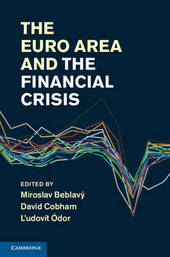
|
The Euro Area and the Financial Crisis
Hardback
Main Details
| Title |
The Euro Area and the Financial Crisis
|
| Authors and Contributors |
Edited by Miroslav Beblavy
|
|
Edited by David Cobham
|
|
Edited by L'udovit Odor
|
| Physical Properties |
| Format:Hardback | | Pages:372 | | Dimensions(mm): Height 229,Width 152 |
|
| ISBN/Barcode |
9781107014749
|
| Classifications | Dewey:332.4566094 |
|---|
| Audience | | Professional & Vocational | |
|---|
| Illustrations |
48 Tables, black and white; 56 Line drawings, unspecified
|
|
Publishing Details |
| Publisher |
Cambridge University Press
|
| Imprint |
Cambridge University Press
|
| Publication Date |
6 October 2011 |
| Publication Country |
United Kingdom
|
Description
The financial crisis of 2007-10 has presented a number of key policy challenges for those concerned with the long-term stability of the euro area. It has shown that price stability as provided by the European Central Bank is not enough to guarantee financial stability, and exposed fault lines in governance and deficiencies in the architecture of the financial supervisory and regulatory framework. This book addresses these and other issues, including why the crisis affected some countries more than others, whether the euro is still attractive for new EU states, and what policy changes and structural reforms, both macro and micro, should be undertaken to ensure its future viability. Written by a team of leading academic and central bank economists, the book also includes chapters on the cross-country incidence of the crisis, the Irish crisis and ECB monetary policy during the crisis, and studies on Spain, the Baltics, Slovakia and Slovenia.
Author Biography
Miroslav Beblavy has an unusual blend of academic and political experience. He is a Senior Research Fellow at the Brussels think tank, Centre for European Policy Studies and, at the same time, Member of the Slovak Parliament. He is also Associate Professor of Public Policy at the Comenius University in Bratislava, Slovakia. In the past, he served as a junior minister in his country's government, created an influential think tank and worked for a range of multilateral development institutions as a consultant in Europe, Africa and the Caucasus. David Cobham is Professor of Economics at Heriot-Watt University. He is a specialist in monetary policy who has worked on UK, French and Italian monetary policy, on European monetary integration and on monetary policy and exchange rate regimes in the Middle East and North Africa. He is the editor or co-editor of a number of books on European monetary integration, including The Travails of the Eurozone (2007) and Twenty Years of Inflation Targeting: Lessons Learned and Future Prospects (Cambridge University Press, 2010). Ludovit Odor is an advisor to the Prime Minister and Minister of Finance in Slovakia. In the past, he served as a member of the Bank Board at the National Bank of Slovakia and Executive Director responsible for research. He also worked as a Chief Economist at the Ministry of Finance of the Slovak Republic. He played an important role in institutional and structural reforms in Slovakia including the euro adoption in 2009.
Reviews'The euro area is in the throes of an existential crisis. Understanding how it can get out requires first understanding how it got in. This book provides the essential background on the onset of the crisis, complete with national variations, before describing what European policy makers should do next. One can only hope that they heed the authors' advice.' Barry Eichengreen, George C. Pardee and Helen N. Pardee Professor of Economics and Political Science, University of California, Berkeley 'A large collection of analyses by many of the best economists. The topic is burning, the discussions go right to the heart of the matter and all big issues are included. Rush to read this book because it deals with front-page news and because things change so fast.' Charles Wyplosz, Professor of International Economics and Director of the International Centre for Money and Banking Studies, The Graduate Institute, Geneva
|